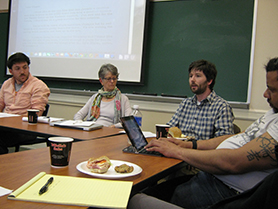LCS Colloquium Features Archival Research Panel
 The Department of English’s recent Literary and Cultural Studies (LCS) Colloquium featured a panel of Carnegie Mellon LCS faculty members and current graduate students who presented their experiences of and strategies for conducting archival research across a variety of different periods, ranging from the early modern to the twentieth century.
The Department of English’s recent Literary and Cultural Studies (LCS) Colloquium featured a panel of Carnegie Mellon LCS faculty members and current graduate students who presented their experiences of and strategies for conducting archival research across a variety of different periods, ranging from the early modern to the twentieth century.
Panelists included professors Kathleen Newman and Kristina Straub, Ph.D. candidates Matthew Lambert and Bret Vukoder, and Ph.D. student Pierce Williams.
The panelists gave expert advice for scholars in the audience planning to use archives.
“Develop relationships with the archivists,” said Professor Newman. “They know everything.”
“You can request up to 10 items at a time at the National Archives,” said Vukoder.
“I’m doing archival research this summer so the panel’s tips were really helpful,” said Pavithra Tantrigoda, a LCS Ph.D. candidate who attended the Colloquium.
Tantrigoda plans to travel to archives abroad to examine legal texts and newspaper and magazine articles in Sinhala on ecological disasters that impacted Sri Lanka, such as the South Asian Tsunami in 2004.
The panelists also covered a variety of different materials including rare books, film prints, and public records and discussed what they mean.
Professor Straub talked about her experience doing archival research as a curator for the exhibition “Will & Jane: Shakespeare, Austen, and the Cult of Celebrity” at the Folger Shakespeare Library. She discussed three lessons she learned from working with archives of objects – rather than print texts.
One lesson she talked about was the advantages and disadvantages of digital research and digital heritage display.
“Both are great supplements to research and brick and mortar museum exhibits, but neither replace the embodied object in real time and space,” said Straub.
Tantrigoda said she also liked how the panelists leveled student’s expectations about archival research. Often times, scholars do archival research thinking that they will find something incredible, but in reality, the panelists said this isn’t always the case.
“A discussion followed the panel presentations that allowed the audience to think about the possible research benefits and/or drawbacks of working with an archive in their own projects, and to consider the implications, both professional and political, of the recent so-called "archival turn" in the field of cultural studies more broadly,” said Steve Gotzler, a LCS Ph.D. student who organized the event.
Traditionally, an archive has been known as a repository of objects and information essential to history. But, in the last half of the 20th century, the archive shifted its emphases from the objects to the archivist, and from place to process.
Professor Newman gave a brief presentation on this shift titled "The Archival Turn in Cultural Studies."
“I argued that in the late 1990s and early 2000s there were three intellectual movements that helped to spur the archival turn,” said Newman. “One was the perceived limitations of the "New Critical" method of doing close readings of literary texts.”
Newman said the second movement was the decline of literary theory as the dominant discourse in English departments. And, the third movement was the rise of "big data" and with it the Digital Humanities.
The panel was organized as part of the LCS Colloquium’s yearlong series on Method.
___
By: Amanda King